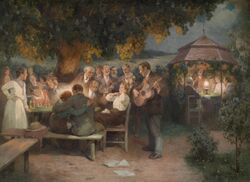Social:Gemütlichkeit




Gemütlichkeit (German pronunciation: [ɡəˈmyːtlɪçkaɪt] (![]() listen)) is a German-language word used to convey the idea of a state or feeling of warmth, friendliness,[1] and good cheer. Other qualities encompassed by the term include cosiness, peace of mind, and a sense of belonging and well-being springing from social acceptance. The adjective "gemütlich" is translated as "cozy" so "gemütlichkeit" could be simply translated as "coziness."
listen)) is a German-language word used to convey the idea of a state or feeling of warmth, friendliness,[1] and good cheer. Other qualities encompassed by the term include cosiness, peace of mind, and a sense of belonging and well-being springing from social acceptance. The adjective "gemütlich" is translated as "cozy" so "gemütlichkeit" could be simply translated as "coziness."
History and etymology
"Gemütlichkeit" derives from gemütlich, the adjective of Gemüt, which means "heart, mind, temper, feeling" expressed by (and cognate with) English mood. The German abstract noun Gemütlichkeit has been adopted into English.[2] The current meaning of the word derives from its use in the Biedermeier period. By the second half of the 19th century, it also became associated with a set of traits supposedly unique to the Austrian culture.
The word can be used in descriptions of holidays.[3] In the 1973 English contract law case Jarvis v Swans Tours Ltd, a holidaymaker sued after not receiving the Gemütlichkeit promised by the promotional literature for a package holiday to the Swiss Alps.
The communal connotations of Gemütlichkeit are also emphasized in some uses of the term. For example, one academic described it as a tradition of "public festivity" (in the form of a "mixture of music, food, and drink"), which "promote[d] community solidarity."Cite error: Closing </ref> missing for <ref> tag Indeed, it is no direct synonym for Gemütlichkeit.
The Swedish language equivalent is gemytlig, deriving directly from the German word and sharing its meaning.
The Danish also has gemytlig[4] [ke̝ˈmytli] but uses hygge [ˈhykə] (hyggelig as an adjective) instead.[5] In Norwegian the word is rendered "gemyttlig", but words such as "hyggelig" and "koselig" which means cosy, comfortable, nice, or pleasant, are analogues.
The Dutch equivalent gezelligheid, derived from the adjective gezellig, has broader social connotations than the German Gemütlichkeit and can be more accurately compared to the Danish term hygge.
In Bulgarian, the word is commonly translated as уют Template:IPA-mk and [ʊˈjut] in Russian, which means cosiness, comfort, contentment, ease, and carries almost identical connotations as the German word.
The Romance languages with Latin roots do not have a single term expressing the many connotations of Gemütlichkeit.
See also
References
- ↑ "Definition of GEMÜTLICHKEIT". http://www.merriam-webster.com/dictionary/gem%C3%BCtlichkeit.
- ↑ Soanes, C. and Stevenson, A. (ed.) (2007). Oxford dictionary of English. Oxford University Press.
- ↑ Benjamin Lytal (2004-12-01). "Recent Fiction". The New York Sun. http://www.nysun.com/pf.php?id=5615&v=3325025911. "Ms. Bielski's novel [The Year is '42] is quite good, a quick read that seems in sync with holiday Gemutlichkeit and holiday sadness."
* Gemütlichkeit PONS Online-Dictionary - ↑ "Gemytlig — den Danske Ordbog". https://ordnet.dk/ddo/ordbog?query=gemytlig.
- ↑ "Enjoying Winter with the Danish Concept of "Hygge"". Iowa Public Radio. 2014-01-13. http://iowapublicradio.org/post/enjoying-winter-danish-concept-hygge.
External links

